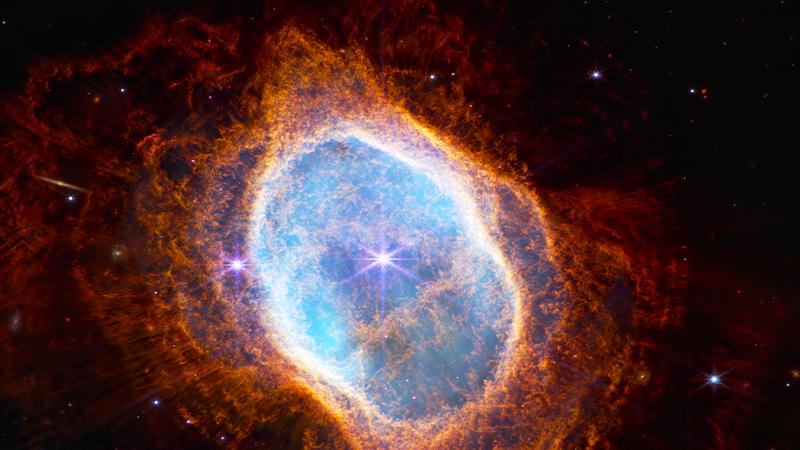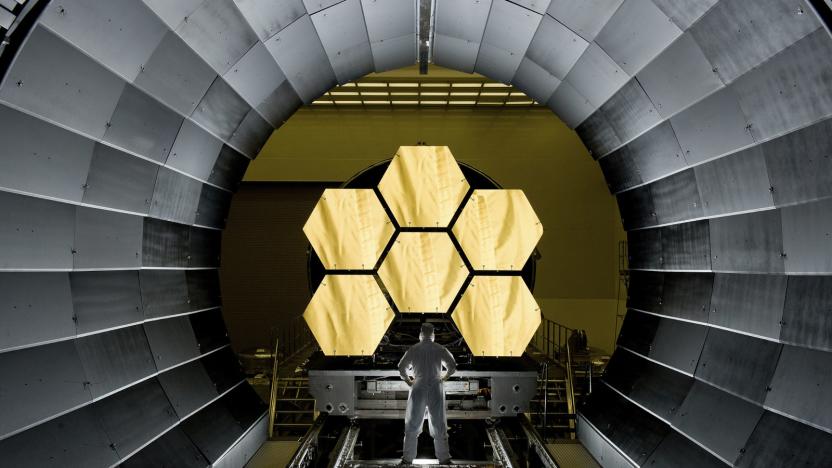CSA
Latest

The Matter smart home standard is finally available
The Matter smart home standard has finally been released, and companies like Amazon, Apple and Google are adopting it.

NASA reveals more stunning images from James Webb telescope
It's able to capture the cosmos in far more detail than Hubble.

NASA reveals details about James Webb Space Telescope's first full-color images
The agency will release the initial batch of images and spectroscopic data on July 12th.

NASA's $10 billion James Webb Space Telescope will study the universe's origins
The James Webb Space Telescope is scheduled to lift off on Christmas Eve. It's mission: Peer deeper into space than ever before.

NASA delays James Webb telescope launch due to poor weather
The James Webb space telescope could begin its journey on Christmas morning.

NASA's Lunar Gateway will feature Canadian Space Agency robotics
The Lunar Gateway, NASA’s outpost that will orbit the moon as part of its upcoming Artemis program, will be equipped with external robotics from the Canadian Space Agency (CSA), NASA announced today.

Canada's Dextre robot refuels faux satellite from the ISS in first-of-a-kind test
Move over, Canadarm. You may have helped the space shuttle fleet repair the Hubble Telescope and build the International Space Station, but there's another robotic tool that's the apple of the Great White North's eye. Dextre, the Canadian Space Agency's dual-armed mechanical "handyman," has successfully refueled a faux satellite from the ISS as part of NASA's and the CSA's joint Robotic Refueling Mission. Not only did the exercise demonstrate how satellites could be juiced up in space and have their lives extended, but the CSA says it's a first for the history books, to boot. Since 2011, Dextre completed a trio of tests to show how it could service satellites that weren't built for being pried opened in space. Late this week, NASA and CSA robotics controllers removed two safety caps from a washing machine-sized mock satellite, snipped two sets of retaining wires and pumped in a bit of ethanol. Sure, you could take a Frankenstein-like approach and cobble together new satellites from old ones, but Dextre's trials indicate there's promise for a proactive tactic that would keep existing hardware humming.

France bans Twitter, Facebook mentions on TV, in the name of market competition
The words "Facebook" and "Twitter" are now verboten on French TV, because France thought it'd be a good idea to follow its own laws. Last week, the country's Conseil Supérieur de l'Audiovisuel (CSA) ruled that TV networks and radio stations will no longer be able to explicitly mention Facebook or Twitter during on-air broadcasts, except when discussing a story in which either company is directly involved. The move comes in response to a 1992 governmental decree that prohibits media organizations from promoting brands during newscasts, for fear of diluting competition. Instead of inviting viewers to follow their programs or stories on Twitter, then, broadcast journalists will have to couch their promotions in slightly more generic terms -- e.g. "Follow us on your social network of choice." CSA spokeswoman Christine Kelly explains: "Why give preference to Facebook, which is worth billions of dollars, when there are many other social networks that are struggling for recognition? This would be a distortion of competition. If we allow Facebook and Twitter to be cited on air, it's opening a Pandora's Box - other social networks will complain to us saying, 'why not us?'" It didn't take long for the US media to jump all over the story, with many outlets citing no less objective a source than Matthew Fraser -- a Canadian expat blogger who claims, in ostensible sincerity, that the ruling is symptomatic of a "deeply rooted animosity in the French psyche toward Anglo-Saxon cultural domination." Calling the ruling "ludicrous," Fraser went on to flamboyantly point out the obvious, stating that such regulatory nonsense would never be tolerated by corporations in the US. But then again, neither would smelly cheese or universal healthcare. Apple, meet orange. Fueling competition via aggressive regulation may strike some free-marketeers as economically depraved, but it certainly won't kill social media-based commerce. Facebook and Twitter have already become more or less synonymous with "social networks" anyway, so it's hard to envision such a minor linguistic tweak having any major effect on online engagement. That's not to say that the new regulation will suddenly create a level playing field -- it won't. But it probably won't put America's social media titans at a serious disadvantage, as some would have you believe. Rather, these knee-jerk arguments from Fraser and others seem more rooted in capitalist symbolism and cross-cultural hyperbole than anything else -- reality, included.

France not exactly rushing to adopt HD
Talk about a let down. According to a new report from Variety, Daniel Bilalian -- France Televisions' director of sports programming -- has announced that "HD transmissions would not be available for this summer's Olympic Games on any of the pubcaster's channels." The article also notes that French networks in general have been slow to move towards high-definition, with only Canal Plus putting forth a proposal for premium HD transmissions (from pay-TV providers). Still, it's noted that private networks TF1 and M6 have "committed to airing at least 80-percent of their content in HD by the end of 2012," but it's not like we're really down with twiddling our thumbs for four more years waiting for it to happen.







